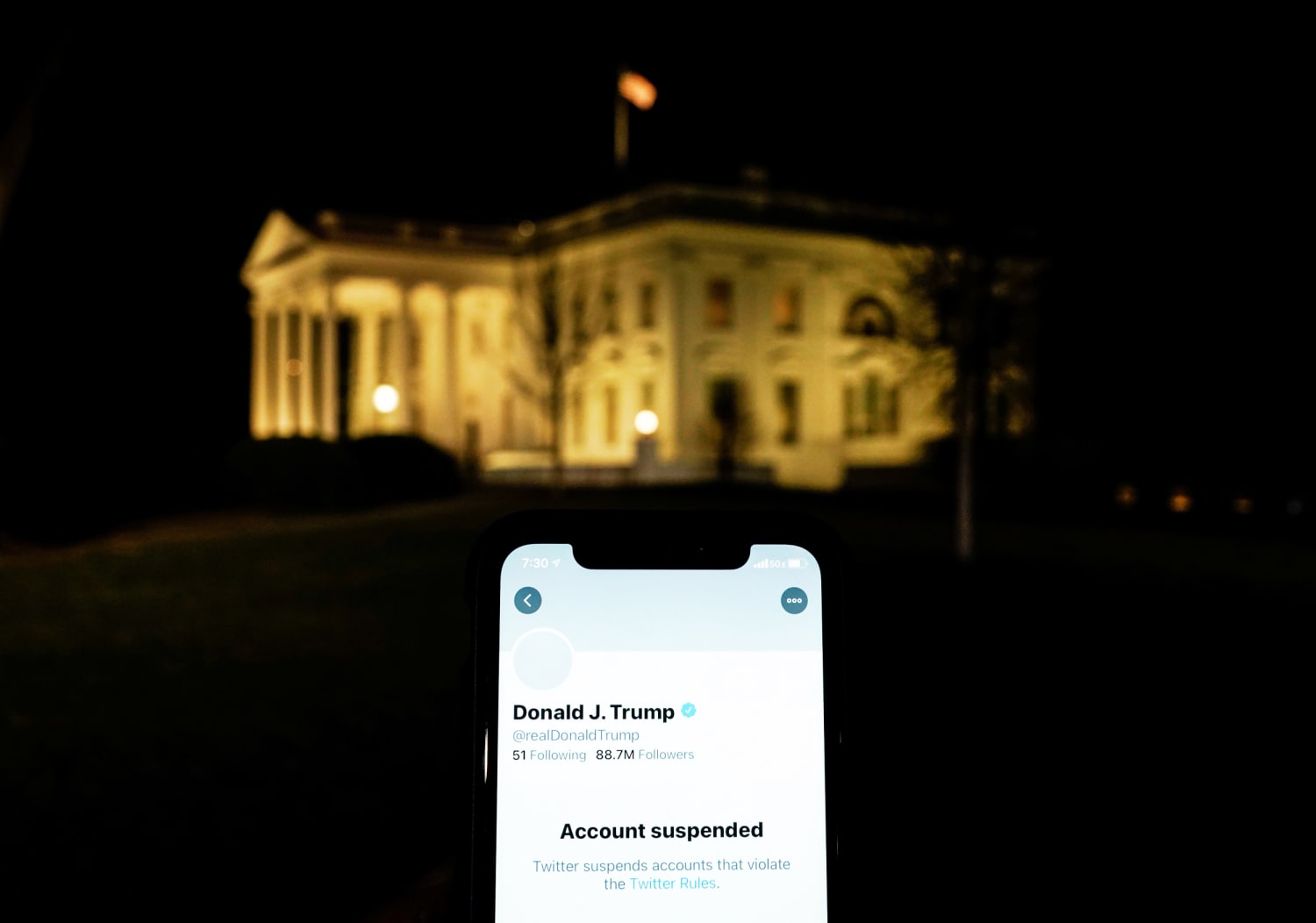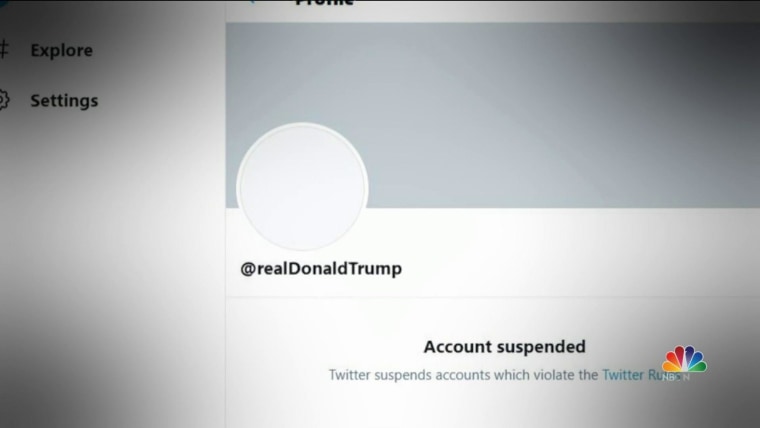President Donald Trump’s internet empire has come crashing down.
Twitter permanently suspended his account Friday. Facebook a day earlier blocked him indefinitely. And any hope he might have had of quickly gaining a big following on Parler, a social network with lax rules, was dashed when Google and then Apple removed it from their app stores.
Even Trump’s email vendor suspended access by his campaign.
The internet as most people know it has decided that Trump is no longer welcome. It’s a turning point for digital speech that was years in the making, but took just a few hours to happen.
The crackdown doesn’t end the conversation about the internet’s rules but instead amplifies a relatively new one that will play out in Silicon Valley executive suites, in the decisions of advertisers and in congressional hearings about Section 230, the law that shields internet companies from much liability. And it points to growing questions about centralization of power on the internet in a handful of companies.
“It’s almost like a bunch of dudes in Silicon Valley who happened to win the start-up lottery shouldn’t be in charge of making the rules the world follows in order to speak,” said Kate Klonick, a St. John’s University law professor who has criticized the lack of accountability for tech companies.
The ACLU expressed concern about the implications of banning a president from an “indispensable” platform, but evensome of the internet’s most ardent free-speech advocates had trouble pushing back against the Trump bans.
“A platform should not apply one set of rules to most of its users, and then apply a more permissive set of rules to politicians and world leaders who are already immensely powerful,” the Electronic Frontier Foundation, which supports privacy and free speech online, said Friday in a statement.
Government policymakers, the group added, should “find ways to foster competition so that users have numerous editorial options and policies from which to choose.”
Tech companies may have come to peace with their roles as speech moderators, taking seriously the enforcement of rules that they’ve written for their own websites and banishing the idea of unmoderated forums. But the path to this point has been messy.
It wasn’t that long ago when it was incredibly hard to get kicked off the internet. Much more common was to be driven off by unrestrained online mobs. In 2014, breaking rules against harassment seemed to have no consequences as female video game players were targeted in a campaign known as Gamergate.
Social media had plenty of rules, laid out in lengthy terms of service written by company lawyers and quickly skimmed or fully ignored by most users. But enforcement was uneven, and there was relatively little outside scrutiny of content moderation decisions.
Tech companies had little experience with politicians who delighted in testing their rules. People with racist views could openly organize online, and the idea that disinformation campaigns on social media could sway an election seemed far-fetched.
It was on that frontier where Trump began to grow into a political force,and for years social media companies accommodated not only his rule-bending but also his threats against the industry.
And in the years since, Trump’s rise coincided with platforms taking more responsibility.
Tech companies flexed their power in 2017 after a white-nationalist rally in Charlottesville, Virginia. The Neo-Nazi website The Daily Stormer lost access to basic internet vendors and was pushed offline, but the actions by tech companies were targeted at a few.
The idea of banning Trump from social media was previously divisive within the tech industry. After Twitter CEO Jack Dorsey declined to suspend him three years ago, though Trump used the service to threaten nuclear war against North Korea, activists resorted to projecting the phrase “@jack is #complicit” onto the company’s San Francisco headquarters.
The First Amendment applies only to the government, not private corporations, but executives such as Dorsey and Facebook CEO Mark Zuckerberg said they were leery of policing the speech of an elected U.S. president.
“I believe people should be able to see this for themselves, because ultimately accountability for those in positions of power can only happen when their speech is scrutinized out in the open,” Zuckerberg said seven months ago, defending Trump’s ability to post about shooting alleged looters.
In 2019, Trump hosted Zuckerberg for dinner at the White House, where the CEO informed the president he was “No. 1 on Facebook,” according to Trump.
Executives maintained their stance even in the face of revolts by their own employees, many of whom lean Democratic, and even as Trump posed a threat to their businesses through his immigration policies, antitrust enforcement and his campaign to repeal Section 230.
But there were also crosswinds, including for business reasons. Advertisers, which generally don’t want to be associated with hate speech, have prompted social media platforms to tighten enforcement by withholding their spending.
Trump’s huge presence on Twitter, where he had nearly 89 million followers, meant he was closely identified with the service, for better or worse. The company became much more profitable over the course of Trump’s presidency.
The shift in Trump’s online fortunes began two months ago, after he lost re-election. A clock started ticking for when he would lose the protection of a special rule that Twitter has for world leaders — a rule Twitter created in 2018 after complaints about Trump.
And then the shift sped up dramatically Wednesday, when a pro-Trump mob overpowered security at the U.S. Capitol, disrupted congressional proceedings and briefly occupied the building in what some of the rioters called an attempt at a revolution. A police officer and four people in the crowd died in the attack.
In the past few days, Trump lost the support of influential people in the tech industry who previously defended his presence on the platforms on free speech grounds. They included former Twitter executive Adam Sharp, former Facebook security chief Alex Stamos and Ben Thompson and Casey Newton, both of whom write newsletters that are widely read in Silicon Valley.
A key consideration was that Trump might use social media during his final two weeks in office to continue to spark violence.
“In 14 days, barring catastrophe, he will be out of office,” Newton wrote in a call to “deplatform” the president. “The only question is how much damage he will do in the meantime — and we know, based on long experience, that his Twitter and Facebook accounts will be among his primary weapons.”
Accommodating Trump after Wednesday’s Capitol takeover would have required even more elaborate rule changes for platforms that had already bent over backward to keep him.
Thompson, a tech industry analyst, wrote Thursday before the Twitter and Facebook bans that “both companies continue to twist their rules, or make new ones after the fact, to justify what are clearly tortured subjective decisions about Trump’s tweets.”
The evolving enforcement has created the impression that tech executives are making the rules up as they go, an appearance of arbitrary decision-making that Republicans in particular are eager to seize on for possible advantage.
Sen. Lindsey Graham, R-S.C., vowed consequences for tech companies’ decision to ostracize Trump, saying in a thread on Twitter Friday that there will be “legal accountability.” That, in turn, may test whether everyday users see the platforms as non-partisan.
Source: | This article originally belongs to Nbcnews.com










